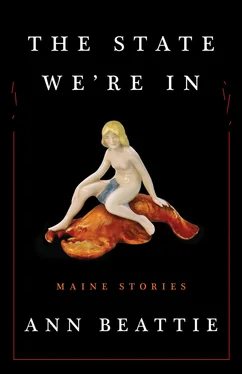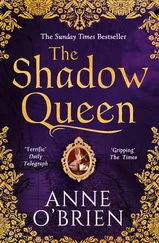“She acts like some sitcom character, always spewing complications. I don’t want a smelly Porta Potti in our backyard and people trampling the flowers.”
“Then call her and tell her that.”
“I’d sound like some neurotic, uncharitable woman who needed to lighten up.”
“Well, isn’t that the case?”
“Every time I tell you a problem that involves something Etta Rae wants, you take it as an excuse to let me know I have deficiencies,” I said. “She provokes fights in our marriage.”
“Call her and tell her that.”
“Why don’t you call Gilly, man-to-man, and say we don’t want to volunteer our backyard.”
He lowered the newspaper. “Tell me exactly why we can’t do it,” he said. “Portable toilets?”
“She probably thinks the guests should go inside the house!” I said.
“We do have two and a half bathrooms. Certainly some guests would want to do something that day other than pee.”
“What about my own antiques?”
“You’re a big girl,” he said. “If you don’t want to do this, be honest about it. She’ll understand. She’ll have to. Or they won’t be our friends anymore, if that’s the way it turns out.” He shrugged. On the front page of the New York Times , Obama’s sideways expression was one of intense sorrow.
“That’s part of the problem,” I said. “I’m a big girl. They’re so self-conscious about their height. It seems like we’re lording it over them that we’re big and powerful and can make any decision we want.”
“Well, we can, about our house.”
“She’ll give me that look,” I said. “Like a crab who’s just had one claw ripped off so somebody can eat it, who knows before it’s tossed back in the water that it’s going to have to regenerate.”
“I appreciate the analogy, but ask yourself: do I sound rational?”
I didn’t, but neither was Etta Rae. Her house was far superior to ours. Why should we go along with her rather audacious request? But I did hate to disappoint her, and the truth was she had to go through life wobbling everywhere in her high heels and dealing with her husband’s insecurity because he’d been so picked on during his childhood. For years, before they married, Gilly had seen a psychologist in Chelsea about his feelings of inferiority. One night, fishing around in his martini, standing with the three of us on our front porch, he’d scrutinized the dripping green olive and said, “If they’d invented bowling with midgets back then, I’d have been a human bowling ball.”
Zelda-land. That had been her proposed name for our old people’s apartment building. Zelda-land.
The next day I called and told her no. I apologized for being so uptight. I invoked my inherited collection of Steuben glass birds and mentioned the many expensive art books on the floor-to-ceiling shelves. I exaggerated the problem with our toilets barely flushing. I said I had to entertain my great-aunt, and I wasn’t sure when she and her companion would be visiting (true). As she listened silently, I added a few more qualms, then invited them to dinner. She said, “I am so surprised and disappointed, I cannot think what to say.”
They did come to dinner, but it was awkward. She didn’t call again all summer, though somehow her husband sent a signal, and he and Jamie had a couple of games of golf. Then came the end of July. The situation had ruined my summer. We didn’t know when the party was given, and we certainly weren’t invited. We found out about it from the FedEx man, who’d been hired to play music with his band. I will always feel as guilty as I imagine an older, wiser boy would feel for having lawn-mowered a turtle in his youth.
The weather that day was everyone’s worst scenario. It was overcast, then fiercely sunny, then gray clouds accumulated and raced forward like cars escaping rush-hour gridlock. Then began a pounding rain. They’d found a tent company earlier in the week that had come from Boston — cocky guys who said that barring a tsunami, their tent would hold. It didn’t, and the groom was leaning against a pole when the entire thing lifted up like an enormous parachute that carried him out over the beach, where rain pounded down like arrows in the Iliad . He went up, up, then down. His hands must have lost their grip on the cloth. While the few drunks who didn’t know what was happening partied on, he was launched like a sailor wrapped in a broken topsail, then fell from a great height onto the rocky beach, where he lay unconscious with a broken pelvis, broken arm, and three snapped ribs.
When I heard this, it made me remember a guide my husband and I had once hired, who’d told us, at the Cliffs of Moher, that the updraft was so fierce that if you threw someone over the edge, they might blow right up again — except in this case the groom didn’t reappear. By the time we found out, the FedEx guy had written a song about it, but as he said to me, “It’s no ‘Sad-Eyed Lady of the Lowlands.’ ”
It will be on my conscience forever, of course: the revenge of the universe for the groom’s mercilessness toward a fellow creature. But in what way does the dainty little doll-bride deserve such a thing, to have the dripping fist of fate grab her tiny companion and hurl him to earth in splinters? In the great flip-book of heaven, where our movement is created and the story reveals itself, what’s to be made of some tragedy in miniature: not two people embracing to waltz with perfect steps and swirling tux tails and a voluminous skirt; not an agile fox chasing a rabbit that outwits him at the last second by burrowing into the hole of a tree… instead, one tiny figure approaching another, clasping that person’s hand, both turning to face the viewer and to take a modest bow, then suddenly we see only the legs of one figure who levitates, the toes of tiny shoes dangling atop the page. Then nothing. Only the bride. White space.
Our flipping thumb runs out of space and time. We can only raise our first finger in the universal sign: a lesson must be learned.
Having learned it, I pass it on.
“We don’t like the children.”
“We do love them, though.”
“Doesn’t matter. We want them to go away.”
“I don’t want Amity to go. She came all the way from Santa Cruz. And I’m sure she didn’t really want to come.”
“She criticized your new glass frames. Then she bragged about her vacation. We don’t like to hear about other people’s vacations.”
“The worst thing is that she’s still with that Andrew. How can she stand that braying voice? At least we didn’t have to hear about Turks and Caicos from him, talking through that big nose like it’s a megaphone.”
“Remember when the hurricane was coming and the police cars came around with recordings blasting, telling us to leave the island?”
“We were dancing inside Harry Burns’s new house. We just kept dancing. He had those expensive shutters that rolled down and locked, so we were inside with the lights on until they all went out.”
“Key West was such a disaster. It would have gotten more attention if New Orleans hadn’t been destroyed.”
“And our little Kenneth, living in the Garden District. He thinks we care that he’s gay, and we don’t care. We’ve run out of different ways to insist that we’re happy if he’s happy. He glowered even as a little child. Maybe his bad eyes are hereditary.”
“You should talk. Wouldn’t you know that your pigeon-toed walk would be exactly the way poor Amity perambulates. None of the other goslings ever walked that way. She imitated everything you did. She still holds her hand out like it’s got a cigarette in it, and you gave up smoking thirty years ago.”
Читать дальше












